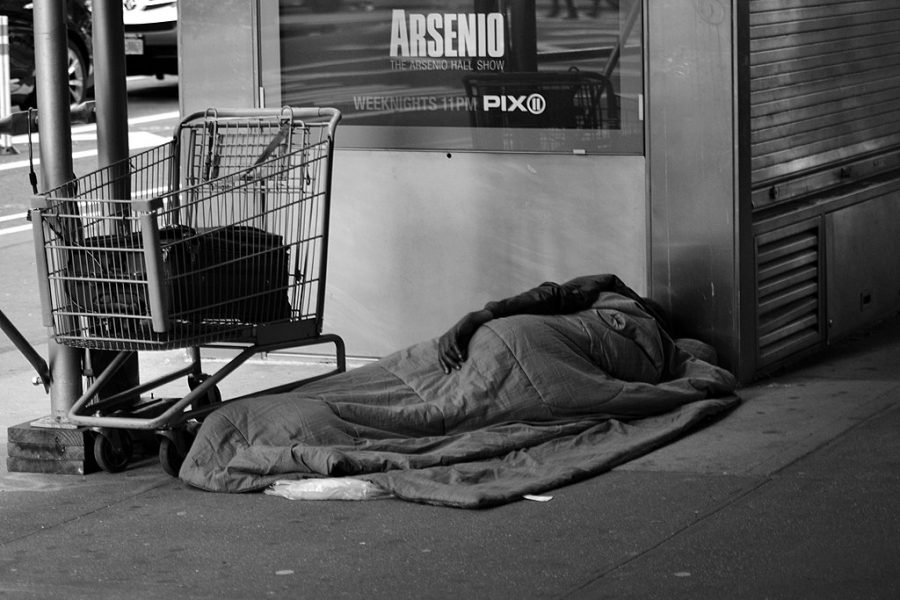The NYC homeless community needs help, not relocation
June 17, 2021
A court recently ruled that 200 homeless men could stay at the Lucerne Hotel in Manhattan’s Upper West Side. This decision blocked New York City’s attempt to relocate these men to a downtown hotel and should signal to politicians and political leaders that relocation is a band-aid solution to homelessness.
During the COVID-19 pandemic, the homeless population has only increased. “One in every 106 New Yorkers is homeless,” according to the Bowery Mission, a nonprofit organization that serves those that are homeless.
New York has dealt with a similar scenario in the past. In the 1980s, the number of manufacturing jobs plummeted and hundreds of thousands of people fled New York in search of work.
When the wealthy left as well, neighborhoods lost value and their contribution of wealth wasn’t flowing in the economy anymore.
“The idea is that when you increase income inequality, you are concentrating a lot of buying power at the top end of the system,” Eric Hirsch, a historian of homelessness and professor at Providence College in Rhode Island, said to City Limits. “The only unsubsidized housing construction is at the luxury end of the market and you’re not building any affordable housing at all unless it’s government subsidized.”
As a result, the remaining New Yorkers who could not afford to move were left jobless and soon became homeless. The solution New York created back then was to introduce homeless shelters.
The same events happened once again when New York shut down in 2020, except the wealthy were fleeing to states like Florida to avoid tax hikes.
For the homeless in New York, however, they were being forced to move even though they did not want to, which was the case when New York City Mayor Bill de Blasio wanted to uproot them from the Lucerne Hotel to the Radisson Hotel.
Through the nonprofit organization West Side Community Organization, Upper West Side residents raised over $100,000 and hired Randy Mastro, who had worked under former Mayor Rudy Giuliani’s administration, to sue the city, according to Curbed. They claimed that some homeless residents’ use of drugs in public, among other reasons, threatened the community’s well-being.
Christopher Brown, co-founder of Downtown New Yorkers Inc., which fought for the homeless to stay in the hotel, hit at the heart of the issue.
“The city has reacted recklessly and erratically by repeatedly uprooting these individuals based on political pressure,” he said, according to The New York Post.
Political pressure is the exact reason why de Blasio wanted to move the homeless in the first place, as he had been planning to turn the shuttered Radisson Hotel into a permanent shelter but abandoned those plans after Lower Manhattan residents sued.
It is not fair to heed the outcry of those who have homes while leaving the homeless migrating from shelter to shelter. Especially during the pandemic, shelters did not meet the needs of those staying in them, like children who missed school because there was no internet connection.
Hence, New York leaders shouldn’t simply cater to the demands of those with money. Instead, resources should be allocated toward making permanent residences for the homeless.
Take California as an example. Los Angeles “sanctioned encampment for homeless people in Los Angeles includes 70 tents and provides bathrooms, showers and 24-hour security,” NPR reported.
Now while the cost of the housing plan, $2,663 per participant, has raised some eyebrows, that is equivalent to the rent of some apartments in New York already.
As New York reopens and commerce leads to a boost in the economy, it should also lead to an increase of funding for developing permanent housing for the homeless or increasing housing vouchers.
Basic functions like voting or getting a job require a person to have a residence. A politician campaigning to help the homeless must understand that getting a job, in turn, leads to a stable income and a possibility of leaving shelters.
In the long-run, if politicians want to help the homeless, they shouldn’t just move them around like pieces on a chessboard. They are human beings, and despite stigma and stereotypes, they are also one’s neighbors.
It’s important to note that many newly homeless people lost their jobs during the pandemic and simply could not pay rent. Though there was an eviction moratorium, some landlords found loopholes and created unlivable conditions that forced people to move out with nowhere to go.
“Many of us at the Lucerne do not wish to move. We don’t want to move because we’ve been moved around quite a bit. And just up and moving like that, especially with such short notice, is traumatizing, to say the least,” Shams, a Lucerne Hotel resident, said.
Even if someone has no source of income, no home to go to and no means of getting a job, that person is still a New Yorker, and it’s time that New York takes action to help the homeless instead of hiding them.







